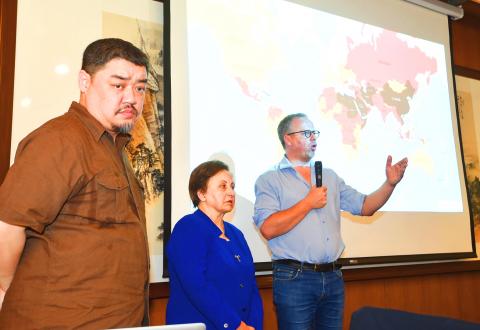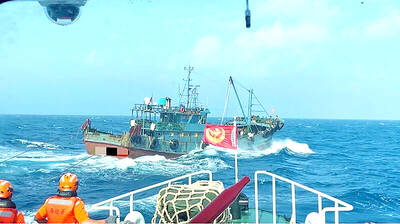Taiwan has a key role to play in addressing China’s threat to press freedom, Reporters Without Borders (RSF) secretary-general Christophe Deloire said yesterday, as the organization launched its first East Asian bureau headquartered in Taipei.
“China wants to set up a new world media order and that’s a vast campaign for China — the country regime wants to change the rest of the world before we succeed in changing China,“ Deloire said. “We consider Taiwan to have a key role to play making China change before China changes us.”
“Taiwan is pure evidence that democracy and press freedom are possible in Chinese culture, and that is really one of the strongest arguments against claims by Beijing authorities their system is really adapted to Chinese culture. Taiwan is probably one of the societies which is most able to exercise an influence not only in China, but also throughout the rest of the world regarding this fight for democracy and press freedom in China,” he said, adding that the bureau would be charged with monitoring regional press freedom and engaging in government advocacy, as well as taking responsibility for regional publications, activities and fundraising.

Photo: Fang Pin-chao, Taipei Times
RSF’s decision to base its bureau in Taiwan has drawn attention as a potential trend away from using Hong Kong as a regional base for the operations of non-governmental organizations, with Freedom House reportedly also considering setting up a regional office in Taichung.
“We chose to open the office in Taipei rather than in Hong Kong because of legal safety and security considerations — there were risks of surveillance against our team in Hong Kong, but not in Taipei,” Deloire said. “Taiwan is also the best area in the whole area in the whole region for press freedom, so it also made sense to set up our office here.”
Taiwan was this year ranked 45th out of 180 nations in RSF’s World Press Freedom Index, compared with South Korea (63), Japan (72) and Hong Kong (73) making it the only nation in the region ranked as “fairly good” instead of “problematic,” “bad” or “very bad.”
“We do not consider Taiwan’s situation perfect, because we do consider there to be a clear lack of independence of newsrooms from boardrooms and owners. There is also even a risk — and sometimes the risk is already a reality — of Chinese interference on the editorial line of media outlets,” Deloire said, calling for the removal of criminal penalties from the nation’s defamation laws.
Taipei was chosen over Taichung and Kaohsiung “because it’s the capital and it’s easier to come and meet people,” Deloire said, adding that he would like to see the bureau hire up to seven people within five years.
RSF Taipei bureau director Cedric Alviani said the group was still completing its government registration, with the Taipei Department of Information and Tourism still preparing the bureau’s office space, which should open by year’s end.
The Cabinet yesterday welcomed and congratulated the RSF on its announcement of plans to open its first Asia bureau in Taipei, an indication of Taiwan’s achievements in democracy, Executive Yuan spokesman Hsu Kuo-yung (徐國勇) said.
Additional reporting by Chen Wei-han

MILITARY BOOST: The procurement was planned after Washington recommended that Taiwan increase its stock of air defense missiles, a defense official said yesterday Taiwan is planning to order an additional four PAC-3 MSE systems and up to 500 missiles in response to an increasing number of missile sites on China’s east coast, a defense official said yesterday. The official, who spoke on condition of anonymity, said that the proposed order would be placed using the defense procurement special budget, adding that about NT$1 trillion (US$32,88 billion) has been allocated for the budget. The proposed acquisition would include launchers, missiles, and a lower tier air and missile defense radar system, they said The procurement was planned after the US military recommended that Taiwan increase

POLITICAL AGENDA: Beijing’s cross-strait Mid-Autumn Festival events are part of a ‘cultural united front’ aimed at promoting unification with Taiwan, academics said Local authorities in China have been inviting Taiwanese to participate in cross-strait Mid-Autumn Festival celebrations centered around ideals of “family and nation,” a move Taiwanese academics said politicizes the holiday to promote the idea of “one family” across the Taiwan Strait. Sources said that China’s Fujian Provincial Government is organizing about 20 cross-strait-themed events in cities including Quanzhou, Nanping, Sanming and Zhangzhou. In Zhangzhou, a festival scheduled for Wednesday is to showcase Minnan-language songs and budaixi (布袋戲) glove puppetry to highlight cultural similarities between Taiwan and the region. Elsewhere, Jiangsu Province is hosting more than 10 similar celebrations in Taizhou, Changzhou, Suzhou,

COGNITIVE WARFARE: Chinese fishing boats transmitting fake identification signals are meant to test Taiwan’s responses to different kinds of perceived incursions, a report said Chinese vessels are transmitting fake signals in Taiwan’s waters as a form of cognitive warfare, testing Taipei’s responses to various types of incursions, a report by the Institute for the Study of War said on Friday. Several Chinese fishing vessels transmitted fake automatic identification system (AIS) signals in Taiwan’s waters last month, with one mimicking a Russian warship and another impersonating a Chinese law enforcement vessel, the report said. Citing data from Starboard Maritime Intelligence, the report said that throughout August and last month, the Chinese fishing boat Minshiyu 06718 (閩獅漁06718) sailed through the Taiwan Strait while intermittently transmitting its own AIS

CHINESE INFILTRATION: Medical logistics is a lifeline during wartime and the reported CCP links of a major logistics company present a national security threat, an expert said The government would bolster its security check system to prevent China from infiltrating the nation’s medical cold chain, a national security official said yesterday. The official, who wished to stay anonymous, made the remarks after the Chinese-language magazine Mirror Media (鏡周刊) reported that Pharma Logistics (嘉里醫藥物流) is in charge of the medical logistics of about half of the nation’s major hospitals, including National Taiwan University Hospital and Taipei Veterans General Hospital. The company’s parent, Kerry TJ Logistics Co (嘉里大榮物流), is associated with the National Committee of the Chinese People’s Political Consultative Conference (CPPCC) and the Chinese People’s Liberation Army (PLA), the